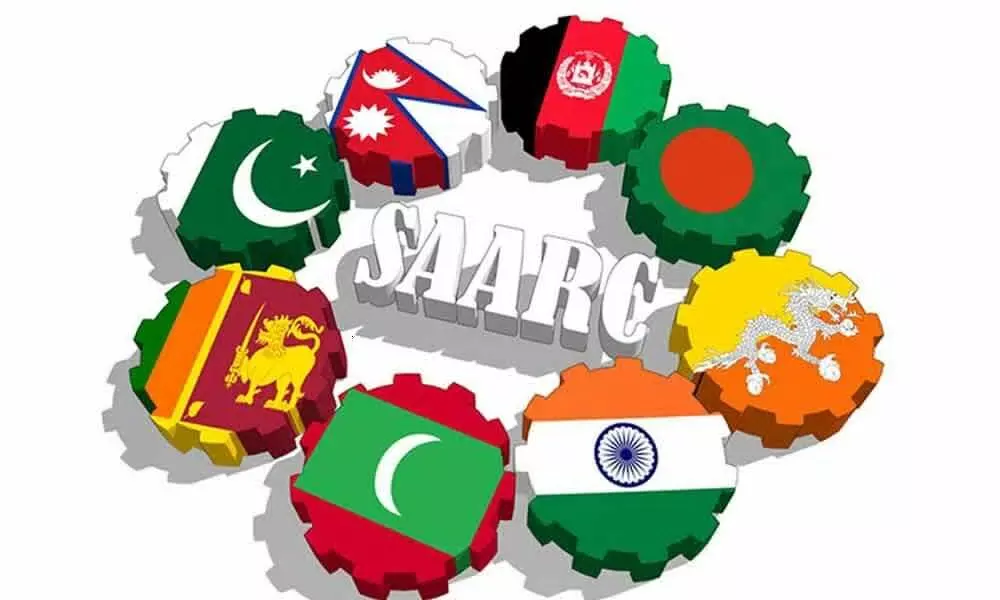Should India stand up to SAARC about removing Pakistan from it?
It was assumed then that SAARC would emerge as a powerful platform and would usher in a new era of development and cooperation in South Asia. But, Pakistan did not live up to India's expectations
image for illustrative purpose

It is a matter of utter bafflement that Pakistan is extending an invite to India to attend the long-pending summit of the South Asian Association for Regional Cooperation (SAARC). The Foreign Minister of Pakistan, Shah Mehmood Qureshi, recently said that if India does not want to participate in the meeting in person, it can participate in the summit virtually. Before inviting India to participate in the SAARC summit, Pakistan should have recalled the cold, lifeless, and disrespectful welcome it offered our then Union Home Minister, Rajnath Singh.
When Rajnath Singh went to Islamabad, the capital city of Pakistan, to attend the conference of the Home Ministers of SAARC countries, he was received very poorly. Unfortunately but not surprisingly, Pakistan failed to be accommodative of other religions that its neighbours' practice. Pakistan has continuously committed such atrocities one after the other. Thus, proving that it does not know how to follow or respect the religions of its neighbouring nations. The handiwork of Pakistan has completely disrupted the SAARC movement.
Now, out of the blue, they have come up with the brilliant idea of organizing the SAARC summit. Could Pakistan kindly clarify, why has it not punished the culprits of the Mumbai terror attacks yet? Why is the ongoing case against those criminals lying frozen in its tracks? India has been telling it time and again that the terrorist Hafiz Saeed, the mastermind terrorist behind the Mumbai terror attacks, should be put in jail immediately. However, Pakistan not only ignored such requests but also in doing so, proved its lack of will to fight terrorism.
They never showed interest in ending terrorism in South Asian countries. They have never deterred from nurturing and funding the anti-national forces in Kashmir or Punjab. The 19th SAARC Summit was to be held in Islamabad in November 2016. But that year the terrorist attack was carried out in Uri, India by Pakistani terrorists in which 17 Indian soldiers were martyred. After this attack, India had refused to participate in the SAARC summit. India's stand was absolutely right.
What to do with a country which has become a factory of terrorism? Those who know Rajnath Singh closely know that he never shied away from telling the truth. Referring to Hizbul terrorist Burhan Wani, who was killed in Kashmir in Islamabad, he said that glorification of terrorism should stop and terrorists should not be given martyr status. Terrorism is not good or bad. Rajnath Singh was pointing towards Pakistan only while stating the same.
Pakistan was furious by this direct attack of Rajnath Singh. But, no one could stop Rajnath Singh from speaking the truth. Now Shah Mehmood Qureshi is claiming that SAARC is an "important forum". India has never denied this, but, when did Pakistan ever allow SAARC to grow and fulfill the purpose for which it was established? Will answers to such questions be provided by Qureshi?
The SAARC was established on 8 December 1985 by Pakistan, India, Bangladesh, Sri Lanka, Nepal, and Bhutan. After this, in April 2007, Afghanistan also got a place as its 8th member. Despite this, SAARC did not promote any kind of economic cooperation among the member countries. If Pakistan is left out, then all the SAARC countries want to work together.
On one hand, Pakistan is inviting India to the SAARC summit and on the other hand, it never deters from trying to pass a resolution against India from the Organization of Islamic Nations. Our Prime Minister, Narendra Modi, had taken a strong initiative to revive a dying organization by inviting leaders of 7 states to his swearing-in ceremony in the year 2014.
It was assumed then that SAARC would emerge as a powerful platform and would usher in a new era of development and cooperation in South Asia. But, Pakistan did not live up to India's expectations. After Imran Khan became the Prime Minister there, the opposition to India became more intense and vocal. India had also promised all possible cooperation of SAARC countries in fighting the global pandemic Covid-19. The way India fought to defeat the Coronavirus, was witnessed by the world including SAARC member nations
Scholars working on India's diplomacy must have understood very well that SAARC has no future. SAARC has also completely lost its usefulness. Now this organization has remained only on paper. So what are the options available to India? India's path is quite clear. India will have to strengthen its relations with all the countries other than Pakistan which are members of SAARC. India is constantly striving in that direction too. India has solid and cordial relations with all these countries. Another option is before the SAARC countries. By removing Pakistan from the SAARC summit, it can create a new productive organization. They have already seen the extent to which Pakistan has derailed SAARC.
Everyone is aware of the background of Pakistan's conflict with India and Bangladesh. While Pakistan itself was a part of India before 1947, Bangladesh was part of Pakistan before 1972. Today, India-Bangladesh's constant opposition is a vital part of Pakistan's foreign policy. So how can India or SAARC expect a cooperative relationship with a country like this? That is why now at least India has to think seriously about the situation ahead, in terms of its relations with other nations and the SAARC movement.
(The writer is a senior editor, columnist, and former MP)

